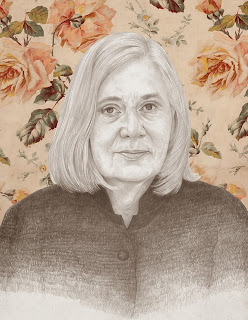[ed. Gilead, one of my favorite books.]
 Marilynne Robinson was my fourth and final workshop instructor at the Iowa Writers’ Workshop. She is an intimidating intellectual presence—she once told us that to improve characterization, we should read Descartes. When I asked her to sign my copy of Gilead, she admitted she had recently become fascinated by ancient cuneiform script. But she is also generous and quick to laugh—when she offered to have us to her house for dinner, and I asked if we ought to bring food, she replied, “Or perhaps I will make some loaves and fishes appear!” Then she burst into giggles.
Marilynne Robinson was my fourth and final workshop instructor at the Iowa Writers’ Workshop. She is an intimidating intellectual presence—she once told us that to improve characterization, we should read Descartes. When I asked her to sign my copy of Gilead, she admitted she had recently become fascinated by ancient cuneiform script. But she is also generous and quick to laugh—when she offered to have us to her house for dinner, and I asked if we ought to bring food, she replied, “Or perhaps I will make some loaves and fishes appear!” Then she burst into giggles.After receiving my MFA this May, I left Iowa believing that there’s no good way to be taught how to write, to tell a story. But there is also no denying that Marilynne has made me a better writer. Her demands are deceptively simple: to be true to human consciousness and to honor the complexities of the mind and its memory. Marilynne has said in other interviews that she doesn’t read much contemporary fiction because it would take too much of her time, but I suspect it’s also because she spends a fair amount of her mental resources on her students.
Our interview was held on one of the last days of the spring semester. The final traces of the bitter winter had disappeared, and light filled the classroom, which now felt empty with just the two of us. My two years at Iowa were over, and I selfishly wanted to stretch the interview for as long as possible.
You recently told the class you had discovered the ending to your new novel—or so you hoped. How does that happen for you? How do you know?
A lot of the experience of the novel—after the beginning—is being in the novel. You set yourself with a complex problem. If it’s a good problem or one that really engages you, then your mind works on it all the time. A novel by its nature is new. The great struggle, conscious or unconscious, is to make sure that it is new. That it actually has raised issues that deserve to be dealt with in their own terms. They’re not terms that you have seen elsewhere. It’s sort of like composing music. There are options that open and options that disappear, depending on how you develop the guidelines. You think about it over time. And then something will appear, something that is the most elegant response to the question that you’ve asked yourself. And it can absorb the most in terms of the complexities that you’ve created.
It struck me when you said we must “trust the peripheral vision of our mind.” It seems like a muscle in your body that you have to develop by training some other part of you.
It struck me when you said we must “trust the peripheral vision of our mind.” It seems like a muscle in your body that you have to develop by training some other part of you.
One reaches for analogies. I think it’s probably a lot like meditation—which I have never practiced. But from what I understand, it is a capacity that develops itself and that people who practice it successfully have access to aspects of consciousness that they would not otherwise have. They find these large and authoritative experiences. I think that, by the same discipline of introspection, you have access to a much greater part of your awareness than you would otherwise. Things come to mind. Your mind makes selections—this deeper mind—on other terms than your front-office mind. You will remember that once, in some time, in some place, you saw a person standing alone, and their posture suggested to you an enormous narrative around them. And you never spoke to them, you don’t know them, you were never within ten feet of them. But at the same time, you discover that your mind privileges them over something like the Tour d’Eiffel. There’s a very pleasant consequence of that, which is the most ordinary experience can be the most valuable experience. If you’re philosophically attentive you don’t need to seek these things out.
In a way, it seems more difficult. Like trying to look beautiful without makeup.
Harder in some cases than others. It is hard. Frankly, I think most people would think that if you look beautiful without makeup, you’re more truly beautiful than if you’re beautiful with makeup. Although that’s an argument in and of itself. If it were simply discipline, like learning to juggle, or something like that, that’s one thing. But it’s finding access into your life more deeply than you would otherwise. Consider this incredibly brief, incredibly strange experience that we have as this hypersensitive creature on a tiny planet in the middle of somewhere that looks a lot like nowhere. It’s assigning an appropriate value to the uniqueness of our situation and every individual situation.
by Thessaly La Force, Vice | Read more:
Image:Denise Nestor